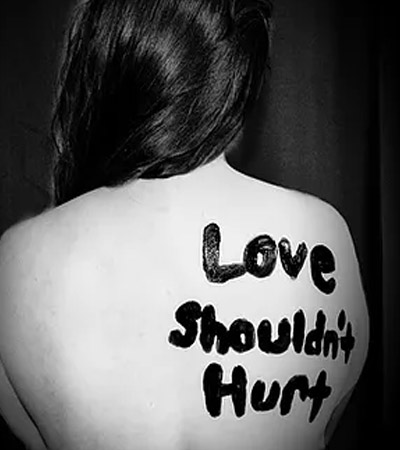Relationships
and Abuse
Many abusive relationships develop gradually and, at first, it might be tempting to write their behaviour off as harmless, perhaps just signs of love or jealousy or emotional insecurity. Some abusers deny being abusive. Some freely admit they have behaved badly, show great remorse, and promise never to do it again – though they almost always do. Here are some warning signs you may be in a controlling or abusive relationship.


Emotional Abuse & Intimidation
- Insulting or criticizing to undermine the victim’s self-confidence. This includes public humiliation, as well as actual or threatened rejection.
- Threatening or accusing, either directly or indirectly, with intention to cause emotional or physical harm or loss. For instance, threatening to kill the victim or himself, or both.
- Using reality distorting statements or behaviors that create confusion and insecurity in the victim like saying one thing and doing another, stating untrue facts as truth, and neglecting to follow through on stated intentions. This can include denying the abuse occurred and/or telling the victim she is making up the abuse. It might also include crazy making behaviors like hiding the victim’s keys and berating her for losing them.
- Consistently disregarding, ignoring, or neglecting the victim’s requests and needs.
- Using actions, statements or gestures that attack the victim’s self-esteem and self-worth with the intention to humiliate.
- Telling the victim that she is mentally unstable or incompetent.
- Forcing the victim to take drugs or alcohol.
- Not allowing the victim to practice her religious beliefs, isolating her from the religious community, or using religion as an excuse for abuse.
- Using any form of coercion or manipulation which is disempowering to the victim.
Physical Abuse
According to the AMEND Workbook for Ending Violent Behavior, physical abuse is any physically aggressive behavior, withholding of physical needs, indirect physically harmful behavior, or threat of physical abuse. This may include but is not limited to:
- Hitting, kicking, biting, slapping, shaking, pushing, pulling, punching, choking, beating, scratching, pinching, pulling hair, stabbing, shooting, drowning, burning, hitting with an object, threatening with a weapon, or threatening to physically assault.
- Withholding of physical needs including interruption of sleep or meals, denying money, food, transportation, or help if sick or injured, locking victim into or out of the house, refusing to give or rationing necessities.
- Abusing, injuring, or threatening to injure others like children, pets, or special property.
- Forcible physical restraint against her will, being trapped in a room or having her exit blocked, being held down.
- The batterer hitting or kicking walls, doors, or other inanimate objects during an argument, throwing things in anger, destruction of property.
- Holding the victim hostage
Sexual Abuse
Sexual abuse is using sex in an exploitative fashion or forcing sex on another person. Having consented to sexual activity in the past does not indicate current consent. Sexual abuse may involve both verbal and physical behavior. This may include, but is not limited to:
- Using force, coercion, guilt, or manipulation or not considering the victim’s desire to have sex. This may include making her have sex with others, have unwanted sexual experiences, or be involuntarily involved in prostitution.
- Exploiting a victim who is unable to make an informed decision about involvement in sexual activity because of being asleep, intoxicated, drugged, disabled, too young, too old, or dependent upon or afraid of the perpetrator.
- Laughing or making fun of another’s sexuality or body, making offensive statements, insulting, or name-calling in relation to the victim’s sexual preferences/behavior.
- Making contact with the victim in any nonconsensual way, including unwanted penetration (oral, anal or vaginal) or touching (stroking, kissing, licking, sucking or using objects) on any part of the victim’s body.
- Exhibiting excessive jealousy resulting in false accusations of infidelity and controlling behaviors to limit the victim’s contact with the outside world.
- Having affairs with other people and using that information to taunt the victim.
- Withholding sex from the victim as a control mechanism.
Isolation
- Isolation is a form of abuse often closely connected to controlling behaviors. It is not an isolated behavior, but the outcome of many kinds of abusive behaviors. By keeping her from seeing who she wants to see, doing what she wants to do, setting and meeting goals, and controlling how she thinks and feels, he is isolating her from the resources (personal and public) which may help her to leave the relationship. By keeping the victim socially isolated the batterer is keeping her from contact with the world which might not reinforce his perceptions and beliefs.
- Isolation often begins as an expression of his love for her with statements like if you really loved me you would want to spend time with me, not your family. As it progresses, the isolation expands, limiting or excluding her contact with anyone but the batterer. Eventually, she is left totally alone and without the internal and external resources to change her life.
- Some victims isolate themselves from existing resources and support systems because of the shame of bruises or other injuries, his behavior in public, or his treatment of friends or family. Self-isolation may also develop from fear of public humiliation or from fear of harm to herself or others. The victim may also feel guilty for the abuser’s behavior, the condition of the relationship, or a myriad of other reasons, depending on the messages received from the abuser.
Verbal Abuse
Coercion, Threats, & Blame: Verbal abuse is any abusive language used to denigrate, embarrass or threaten the victim. This may include but is not limited to:
- Threatening to hurt or kill the victim or her children, family, pets, property or reputation.
- Name calling (‘ugly’, ‘bitch’, ‘whore’, or ‘stupid’).
- Telling victim she is unattractive or undesirable.
- Yelling, screaming, rampaging, terrorizing or refusing to talk.
Economical Abuse
Financial abuse is a way to control the victim through manipulation of economic resources. This may include, but is not limited to:
- Controlling the family income and either not allowing the victim access to money or rigidly limiting her access to family funds. This may also include keeping financial secrets or hidden accounts, putting the victim on an allowance or allowing her no say in how money is spent, or making her turn her paycheck over to him.
- Causing the victim to lose a job or preventing her from taking a job. He can make her lose her job by making her late for work, refusing to provide transportation to work, or by calling/harassing/calling her at work.
- Spending money for necessities (food, rent, utilities) on nonessential items (drugs, alcohol, stereo equipment, hobbies.)
Material from Women’s Center and Shelter of Greater Pittsburgh Volunteer Training Manual, AMEND, and the ACESDV safety plain manual were used to develop this section.
